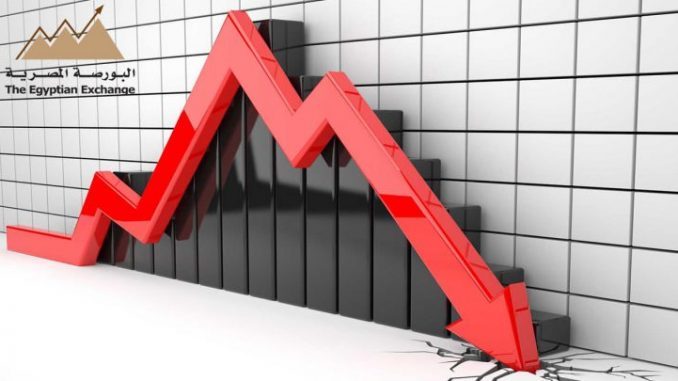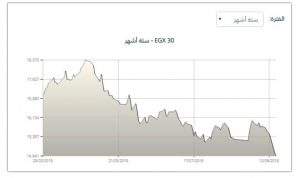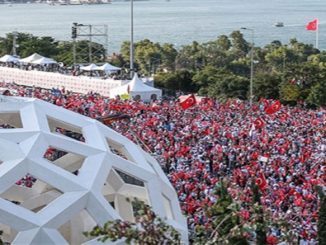
 Dr. Ahmed Zikrallah*
Dr. Ahmed Zikrallah*
Investors in the Egyptian stock exchange experienced panic after the main index fell on Wednesday (19 September) by 3.79% to reach 14098 points, the lowest level since January, and the market capital lost about LE29.3 billion to LE785.649 billion. Thus, the Egyptian stock exchange has lost about 90 billion pounds since the beginning of September.
The collapse followed several months of boom in the wake of the decision to float the country’s local currency (Egyptian pound) by the end of 2016, which led to the devaluation of the Egyptian shares denominated in Egyptian pounds compared to the dollar. Accordingly, the local investors, Arabs and foreigners poured money that pushed the main index to achieve historic peaks exceeding 18000 points, and raised market capitalization to more than one trillion pounds in the trading session of April 25.
The decline during September was not the first of its kind, as it was preceded by a general performance decline in the Egyptian Stock Exchange that started in mid-April, albeit gradual but striking. The following figure shows the performance of the Egyptian Stock Exchange during the last six months, as follows:

Source: The Egyptian Stock Exchange’s bi-annual report
The above figure shows the successive declines of the main index of the stock exchange during the last six months to 12/9/2018, only one week before the current sharp declines, as the historical data of the Egyptian Stock Exchange reveals the huge losses that hit the market capitalization of restricted companies during the last five months, estimated at LE220 billion (approximately quarter of the total value).
According to the given data, the indicators witnessed a collective decline during the period in question. The main index “EGX30” fell from 18363 to 14083 points, losing 4,280 points, a decline of 30.4%.
There are many economic and political factors that can contribute to explaining the causes of decline in general, and the recent sharp decline in particular, including:
First: Internal Factors
Observers monitor a number of the main internal factors that caused the recent collapse in the Egyptian Stock Exchange, most notably:
1- Confiscation of Muslim Brotherhood Assets
The judicial committee on seizing, managing, and disposing terrorist Islamic groups’ assets has decided to confiscate the assets and funds of 1589 individuals belonging to the Muslim Brotherhood and to transfer their funds to the State Treasury, while many other names were referred to the examination committee for complementary investigations, as well as the seizure of 118 various companies, 1133 NGOs, 104 schools, 69 hospitals, and 33 websites and satellite channels. The committee relied on the Article 11 of Law No. 22 of 2018, which allows it to dispose of the seized assets.
The regime in Egypt, according to many observers, has returned to targeting the capital of citizens as well as companies owned by political opponents, through confiscation of their assets after absence for more than half a century in violation of the Constitution.
Undoubtedly, the confiscation of assets arouses panic among Egyptian and foreign investors and pushes for the transfer of funds to safer countries, especially in the absence of legal justification for such move, taking into consideration that it was dependent on a new law enacted in the same year for this purpose, amid a global follow-up of multiple violations committed against the opposition.
Here, we can state that the relative weight of this factor on the recent decline in the stock market is weak, as such procedures actually started in 2014.
2- Arrest of Alaa and Gamal Mubarak
On Saturday morning (15 September), the Cairo Criminal Court ordered the two Mubarak sons (Sons of former Egyptian President Hosni Mubarak: Alaa, a businessman, and Gamal, a banker) and other defendants be arrested in relation to a stock market manipulation case involving the sale of the National Bank of Egypt prior to 2011. Three other men including Yasser El Mallawany and Hassan Heikal, current and former board members respectively at Egyptian investment bank EFG-Hermes, were also arrested, a judicial source said. All those accused in the case, which began in 2012, had been released on bail and barred from travel.
There is no doubt that the above names are for heavyweight businessmen, especially in the financial sector, and that the move of re-arresting Mubarak’s sons is a threat to a long list of former members of the former National Democratic Party, whose interests were effectively damaged by the military overriding of most civil works, which led some to refer the latest decline in the Stock Exchange to the arrest of some of them.
It is worth noting here that these businessmen and those who are backing them have economic and interrelated relations that cannot be ignored. But the question is whether they can – after the regime has crossed all the red lines in killing, imprisoning, intimidating, deporting, and confiscating funds and assets – even against former senior commanders in the armed forces – challenge the regime; and to what extent can their financial and investment capabilities influence the stock market?
Historical data from the Egyptian stock exchange indicate that the bleeding did not begin last week but was over five months, during which the arrested persons were at large exercising their economic activities freely.
The researcher sees that Mubarak’s men know that it is in their interest not to confront the regime openly and sharply for fear of seizure and confiscation, especially that they can still make big profits even in light of the economic domination of the military institution.
It should also be noted that assuming that some improvement might occur in the performance of the stock market in the coming days, this would fall within the framework of the natural rebound that occurs after major collapses, but has nothing to do with the release of defendants.
It is therefore possible to say that the relative weight of this factor may seem weak and would not lead to such huge declines, which actually began months before the arrests.
3- Preparing Theater for Offering Shares in 5 State Companies
Minister of Public Enterprises Sector Hesham Tawfik announced on Monday 17 September that Egypt will offer additional shares in five state companies over the next three months at prices within 10 percent of stock market levels. “We will offer another block of companies over a period of between six and nine months after the end of the first phase of five company offerings,” Tawfik added. The government will also sell land from 11 cotton gins worth 27 billion Egyptian pounds ($1.5 billion), after reclassifying the companies’ legal purpose from industrial activity to real estate. Egypt is working on selling shares in at least 23 state-owned companies over the next few years across several sectors to help boost public finances. The finance minister has said that in October Egypt will begin selling an additional 4.5 percent of cigarette maker Eastern Company’s shares, as well as a 20 percent stake in Alexandria Mineral Oils Company (AMOC). The state owns vast swathes of Egypt’s economy, including three of its largest banks along with much of its oil industry and real estate sector.
Many believe that the Egyptian stock market has collapsed over the past five months after a historic rise of 18 consecutive months has no rational reasons. Also, the low liquidity injection in the local market is intended to create a systematic decline in preparation for the new government offers.
Market makers and their executive departments have created a situation of lack of liquidity and unjustified decline over the past period. The market’s decline is contrary to what most reports indicate about improving macroeconomic indicators, especially with respect to the decline in inflation and the improvement in growth rates. They also point out that market makers would never accept high prices as fair values for the purchase of offered shares and that their interest lies in continuing the planned decline to buy shares at a price below market prices, especially as the stock valuation process will not be carried out on the prior assessment of international experience houses as supposed , which was explained by a statement of the Minister of Public Enterprises Sector, confirming that the shares in five state companies will be offered over the next three months at prices within 10 percent of stock market levels, according to Reuters.
They emphasize that market makers’ resort to the huge collapse in the form of a strong shock is aimed at removal of suspicions of manipulation, especially in light of coincidence with a combination of internal and external factors that represent a cover and a justification for such decline. Furthermore, it is believed that the arrest of Gamal and Alaa Mubarak was only a smoke bomb to cover up what they are doing to cause price cuts.
The researcher believes that this factor is an important factor that must be taken into account and that it has a high relative weight, given the historical precedents in the process of privatization.
4- Dismissal of prominent pro-regime TV presenters
Over the past few years, the Sisi regime has controlled almost all media platforms, through the intelligence services’ dominance of satellite channels, newspapers and websites. Recently, the regime has dismissed heavy-weight pro-regime TV presenters (of the first class of media professionals). But the question remains whether these media professionals have the ability to influence the status of the Egyptian capital market with all its Egyptian, Arab and foreign investors.
The researcher believes that the relative weight of this factor is the weakest among all the internal factors mentioned above.
Second: External Factors
Analysts highlight a range of external factors that have contributed to the recent stock market crash, most notably:
1- Further escalation of the US-China trade war
China and the United States plunged deeper into a trade war on Tuesday, 18 September after Beijing added $60 billion of U.S. products to its import tariff list in retaliation for President Donald Trump’s planned levies on $200 billion worth of Chinese goods. The tit-for-tat measures are the latest escalation in an increasingly protracted trade dispute between the world’s two largest economies, according to Reuters. On September 17, one day earlier, the U.S. administration said it will begin to levy new tariffs of 10 percent on about $200 billion of Chinese products to start on Sept. 24, with the tariffs to go up to 25 percent by the end of 2018. “China is forced to respond to U.S. unilateralism and trade protectionism, and has no choice but to respond with its own tariffs,” the Chinese Finance Ministry said in a statement on its website on Tuesday.
So far, the United States has imposed tariffs on $50 billion worth of Chinese products to pressure China to make sweeping changes to its trade, technology transfer and high-tech industrial subsidy policies. Beijing has retaliated in kind, but some analysts and American businesses are concerned it could resort to other measures such as pressuring U.S. companies operating in China.
While both sides said they were open to talks, Trump launched a Twitter broadside at China, accusing Beijing of targeting rural voters who had supported his presidency by hitting agricultural goods. The European Union trade chief said the tariff issues between the two should be resolved through the World Trade Organization. The EU and the United States have declared a truce in their own trade dispute while they negotiate. “Trade wars are not good and they are not easy to win, and this escalation is of course very unfortunate,” European Trade Commissioner Cecilia Malmstrom told reporters, echoing one of Trump’s catch phrases that trade wars were easy to win.
Observers believe that the US-Chinese trade war will not be limited to the two countries but will extend to the rest of the world countries, especially in light of Trump’s insistence on undermining the current world trade system and entering into trade disputes on various fronts, including the EU countries: Germany and then Turkey. Also, some attribute the collapse of the Egyptian stock market to this trade war and recent decisions by China and the United States. The US-Chinese dispute was behind reduction of international trade movement, according to the World Trade Organization; which negatively affects the traffic in the Suez Canal and thus reduces its returns.
It should be noted that the size of the interplay between the Egyptian economy and the world is very limited (whether in exports or imports), compared to the world’s large and medium-sized economies, in addition to the government’s move to raise the customs duties for four consecutive times, the floating of the Egyptian pound, and the high inflation rates, especially for basic consumer goods – which makes it difficult for the Egyptian economy to be affected by the ongoing trade war between the US and China.
The researcher concludes that the relative weight of this factor (the trade war between China and the US) on the recent sharp decline of the Egyptian stock exchange is weak.
2- US interest rate hikes
The US Federal Reserve announced Wednesday (March 21) that it would raise its benchmark interest rate by 25 basis points, to a range of 1.50% to 1.75%. The Fed signaled two more rate hikes in 2018 amid speculation that it was considering adding a third increase to its projections. But it raised its forecasts for hikes in 2019 and 2020, citing a stronger outlook on the economy.
In the case of Egypt, the US interest rate hikes have a lot of disadvantages, most prominently the emigration of money abroad in search of safe haven, especially if it is in the original home of the dollar amid high interest rates. Some analysts refer the recent collapse in the Egyptian stock market to the higher interest rates in the United States.
3- Saudi Financial Crisis
On April 1, Saudi Arabia closed a $16 billion syndicated loan to refinance its $10 billion facility signed in 2016. The deal, which closed on March 19, consists of an $8.35 billion term loan and a $7.65 billion murabaha financing, according to Reuters. The new deal included the extension of its maturity to 2023 from 2021 and a repricing that is 30 percent lower than on the original loan, bringing pricing to 84 basis points over Libor from the 120 basis points over Libor for 2016 deal.In March, the Kingdom’s Debt Management Office (DMO) said it was expanding the refinancing of a $10 billion international loan to raise $16 billion, which would include a Sharia-compliant instrument. Saudi Arabia had raised the original $10 billion loan from 14 core banks, the DMO said.
Undoubtedly, the Egyptian economy will be affected by any Saudi economic crisis, especially in light of the Egyptian regime’s reliance on the Saudi financial support, as well as the presence of more than 2 million Egyptian workers in the Kingdom. Saudi Arabia’s economic support for the current regime in Egypt cannot be ignored, nor is the significance of the Kingdom’s absorption of this large number of Egyptian labor. But it is difficult to say that the Egyptian stock market has collapsed due to the economic problems facing the Kingdom, especially as Saudi aid to Egypt continues to flow, as well as the Saudi commitment to providing oil supplies to Egypt via ARAMCO.
Therefore, the researcher believes that the relative weight of this factor on the recent collapse of the Egyptian stock market can be considered very weak.
4- Turmoil of Emerging Markets
Emerging markets or emerging countries are those countries that possess some characteristics of developed countries but do not meet all their standards. The peoples of these countries have low or middle incomes, constituting about 80% of the world’s population and about 20% of the world’s economies.
Many of the emerging markets are suffering from violent economic turmoil, especially Argentina, which was forced to raise interest rates by the end of August, to 60 percent after the local currency continued to suffer horrendous losses.
Of course, the turmoil of the emerging markets and the raising of interest rates have negative effects on Egypt, most prominently the emigration of the hot money invested in public debt instruments abroad in anticipation of high interest rates in other markets.
According to a recent statement issued by the Egyptian Ministry of Finance, about 6.1 billion dollars were transferred in the last four months, which led observers to consider the turmoil of emerging markets as one of the factors for the collapse of the Egyptian stock exchange.
Thus, despite the long period of turmoil, suffered by the emerging markets (since 2015), volatility experienced during last month was the most violent crisis, which is likely to be the most important factor among all the internal and external factors that were behind the sharp decline of the Egyptian stock market.
Conclusion
Despite the presence of many internal and external economic factors, to which the recent collapse in the Egyptian stock exchange may be attributed, but the preparation of the stage for the expected government offers through manipulation of performance and prices, as well as the turmoil of emerging markets, are the most influential factors from the point of view of the researcher regarding the continued decline of the Egyptian Stock Exchange, taking into account that the preparation for the government’s expected offers represents a higher relative weight. The question is whether the government can sell these shares amid the current collapse of stock market prices; and if so, is there a kind of complicity between the market makers and their executive circles, and who will buy these shares?
*Dr. Ahmed Zikrallah is an Egyptian academic, professor of economics at Al-Azhar University’s Faculty of Commerce. He is also an expert and consultant in training and feasibility studies.
(This article was published on the Egyptian Institute for Studies on October 9 2018)



